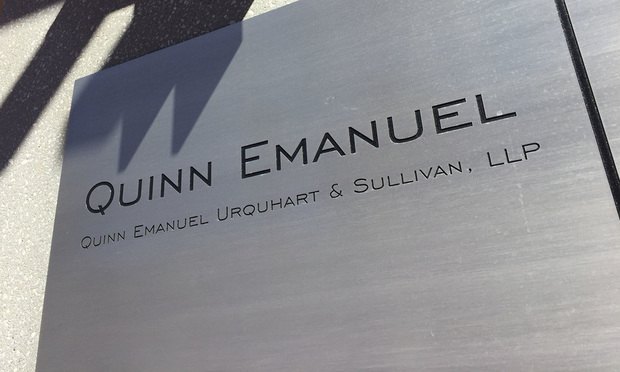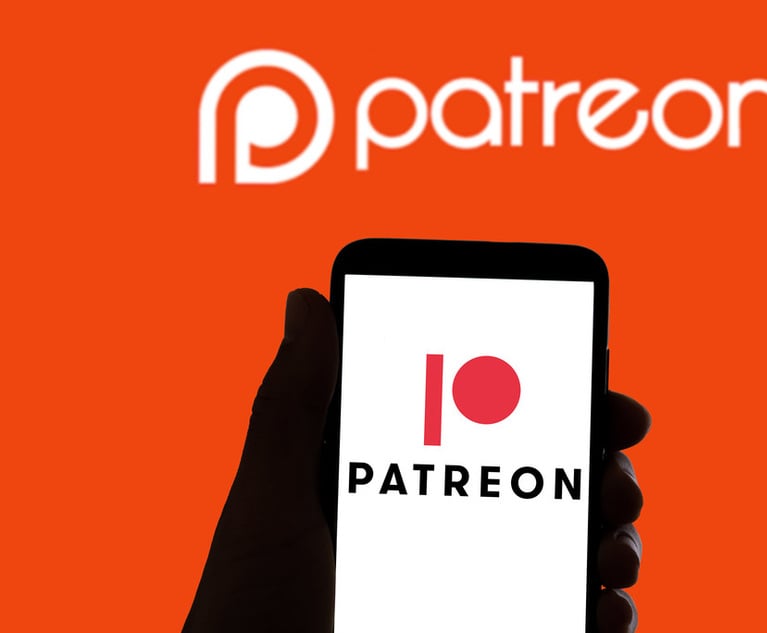Quinn Emanuel Pushes Back Against Uber's Disqualification Bid in Sidecar Case
The firm claims that its prior representation of Uber wasn't substantially related to the antitrust claims it's pursuing on behalf of the ride-hailing app's defunct rival Sidecar.
March 18, 2019 at 03:25 PM
4 minute read

Lawyers from Quinn Emanuel Urquhart & Sullivan are fighting an attempt by their former client, Uber Technologies Inc., to disqualify the firm from pursuing antitrust claims against it by a former rival ride-hailing app.
Uber's current lawyers at Gibson, Dunn & Crutcher filed a motion in February to disqualify Quinn Emanuel from representing SC Innovations Inc., the successor to the defunct Sidecar ride-sharing company. Uber contends that Quinn Emanuel represented it in at least 20 cases from 2012 to 2016 that delved into competition issues like the Sidecar case. The company also claimed that Quinn Emanuel lawyers had access to confidential Uber information.
But in opposition papers filed March 15, Quinn Emanuel lawyers said that there was no evidence that the firm's prior work for Uber was “substantially related” to its work for Sidecar and that the firm has never been in possession of confidential information that would bar its participation in the antitrust suit against Uber.
“When the actual evidence is examined, the only reasonable conclusion is there is no basis to deprive Sidecar of its chosen counsel,” wrote the Quinn lawyers, including Robert Feldman and Claude Stern in the firm's Redwood Shores, California, office, and Ethan Glass and Michael Bonanno in Washington, D.C.
The Quinn Emanuel lawyers filed suit on behalf of Sidecar's successor late last year, claiming that Uber is a “monopolist” in the ride-hailing market. They claimed that Uber stole Sidecar's business model and “intentionally sustained near-term losses that were designed to drive Sidecar out of the market while Uber acquired a dominant market position.”
In last week's filings, the Quinn Emanuel lawyers acknowledge that the firm represented Uber in a series of lawsuits earlier this decade primarily brought by taxicab associations alleging that Uber didn't comply with local taxi regulations. “But whether Quinn Emanuel previously represented Uber in a single case or one hundred cases does not matter,” the Quinn Emanuel lawyers wrote. “Uber must show the prior cases are substantially related to Sidecar's case, or that Quinn Emanuel actually received confidential information that is material to the Sidecar case. Generalized claims about the nature of Quinn Emanuel's prior relationship with Uber do not meet either of those standards.”
As part of the motion to disqualify the Quinn Emanuel firm, Uber's lawyers at Gibson Dunn contended that during the early days of Quinn Emanuel's representation of the company, Uber's then-general counsel Salle Yoo sought antitrust advice from Quinn Emanuel lawyers, including the firm's founder and managing partner, John Quinn.
Yoo said in a declaration attached to the company's motion that she “viewed Quinn Emanuel as an important strategic partner to Uber in advising on these matters and anticipated that the firm's work for Uber would grow over time.” Uber's motion included a quote from Quinn in a media story saying “Uber would rather compete for business on the streets … than in the courtroom.”
Quinn filed his own declaration supporting Quinn Emanuel's motion March 15, saying that he billed less than 25 hours of time during the course of the representation of Uber. Quinn said that since Uber and Yoo hadn't “provided any identification of the matters” about which he allegedly gave “strategic antitrust compliance advice related to Uber's business model and conduct,” he could only say that he couldn't recall any such matters.
“Had I given such advice, my billing records would ordinarily so reflect; they contain no indication of this activity,” Quinn wrote. “In addition, if I gave such advice, I likely would have involved lawyers at the firm with substantial antitrust expertise; there is no indication I did so in my time records.”
Quinn specified that his declaration was prepared in consultation with the firm's internal conflicts counsel and not with any of the lawyers working on the Sidecar case. The Quinn Emanuel lawyers say they have implemented an “ethical wall” to prevent “substantive communications” between anyone working on the Sidecar case and Quinn Emanuel lawyers who previously handled work for Uber.
This content has been archived. It is available through our partners, LexisNexis® and Bloomberg Law.
To view this content, please continue to their sites.
Not a Lexis Subscriber?
Subscribe Now
Not a Bloomberg Law Subscriber?
Subscribe Now
NOT FOR REPRINT
© 2025 ALM Global, LLC, All Rights Reserved. Request academic re-use from www.copyright.com. All other uses, submit a request to [email protected]. For more information visit Asset & Logo Licensing.
You Might Like
View All
'A Death Sentence for TikTok'?: Litigators and Experts Weigh Impact of Potential Ban on Creators and Data Privacy

‘Extremely Disturbing’: AI Firms Face Class Action by ‘Taskers’ Exposed to Traumatic Content
5 minute read

Patreon Hit With Lawsuit for Allegedly Diverting Subscriber Data to Meta
Trending Stories
Who Got The Work
J. Brugh Lower of Gibbons has entered an appearance for industrial equipment supplier Devco Corporation in a pending trademark infringement lawsuit. The suit, accusing the defendant of selling knock-off Graco products, was filed Dec. 18 in New Jersey District Court by Rivkin Radler on behalf of Graco Inc. and Graco Minnesota. The case, assigned to U.S. District Judge Zahid N. Quraishi, is 3:24-cv-11294, Graco Inc. et al v. Devco Corporation.
Who Got The Work
Rebecca Maller-Stein and Kent A. Yalowitz of Arnold & Porter Kaye Scholer have entered their appearances for Hanaco Venture Capital and its executives, Lior Prosor and David Frankel, in a pending securities lawsuit. The action, filed on Dec. 24 in New York Southern District Court by Zell, Aron & Co. on behalf of Goldeneye Advisors, accuses the defendants of negligently and fraudulently managing the plaintiff's $1 million investment. The case, assigned to U.S. District Judge Vernon S. Broderick, is 1:24-cv-09918, Goldeneye Advisors, LLC v. Hanaco Venture Capital, Ltd. et al.
Who Got The Work
Attorneys from A&O Shearman has stepped in as defense counsel for Toronto-Dominion Bank and other defendants in a pending securities class action. The suit, filed Dec. 11 in New York Southern District Court by Bleichmar Fonti & Auld, accuses the defendants of concealing the bank's 'pervasive' deficiencies in regards to its compliance with the Bank Secrecy Act and the quality of its anti-money laundering controls. The case, assigned to U.S. District Judge Arun Subramanian, is 1:24-cv-09445, Gonzalez v. The Toronto-Dominion Bank et al.
Who Got The Work
Crown Castle International, a Pennsylvania company providing shared communications infrastructure, has turned to Luke D. Wolf of Gordon Rees Scully Mansukhani to fend off a pending breach-of-contract lawsuit. The court action, filed Nov. 25 in Michigan Eastern District Court by Hooper Hathaway PC on behalf of The Town Residences LLC, accuses Crown Castle of failing to transfer approximately $30,000 in utility payments from T-Mobile in breach of a roof-top lease and assignment agreement. The case, assigned to U.S. District Judge Susan K. Declercq, is 2:24-cv-13131, The Town Residences LLC v. T-Mobile US, Inc. et al.
Who Got The Work
Wilfred P. Coronato and Daniel M. Schwartz of McCarter & English have stepped in as defense counsel to Electrolux Home Products Inc. in a pending product liability lawsuit. The court action, filed Nov. 26 in New York Eastern District Court by Poulos Lopiccolo PC and Nagel Rice LLP on behalf of David Stern, alleges that the defendant's refrigerators’ drawers and shelving repeatedly break and fall apart within months after purchase. The case, assigned to U.S. District Judge Joan M. Azrack, is 2:24-cv-08204, Stern v. Electrolux Home Products, Inc.
Featured Firms
Law Offices of Gary Martin Hays & Associates, P.C.
(470) 294-1674
Law Offices of Mark E. Salomone
(857) 444-6468
Smith & Hassler
(713) 739-1250






